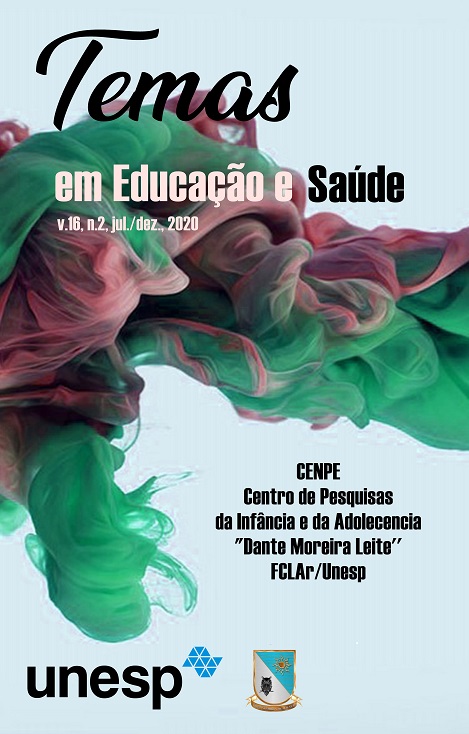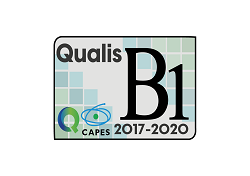The absence of dialogue in the process of professional formation in health in remote education: impacts on the learning and mental health of academics
DOI:
https://doi.org/10.26673/tes.v16i2.14403Keywords:
Professional qualification, Remote teaching, Dialogue, Learning, Mental healthAbstract
In this text the objective is to analyze the meanings that students have been producing about the process of professional health education in remote education. To achieve the proposed objective, we appropriate the theoretical and methodological assumptions of Freirean Pedagogy, especially the assumptions of the dialogue category. The question that guided this research was: In the speeches of students and professors of undergraduate courses in the health area of a public university in Piauí, what are their possible meanings (senses and meanings) produced about the professional formation process in remote education? Ten (10) academics participated in the study, 5 (five) of the Physical Education degree course and 05 of the Bachelor's degree in Psychology. Specifically, on the production of data, the semi-structured interview was used, which took place from October 5 to 7, 2020. The research results show that teaching centered on the teacher, anchored in the dynamics of listening, in the impossibility of saying the word, interaction and exchange of experiences hampers the knowledge production process. In addition, the meanings produced from the speeches of the academics investigated, show that the absence of dialogue, in addition to making it impossible to pronounce the world through words, institutes the culture of pretending to teach and pretending to learn. For them, this situation causes pain and suffering, as they feel guilty about the teaching process. Which in turn ends up impacting mental health. We believe that the meanings produced by students, from Physical Education and Psychology courses to the process of professional formation in health in remote education, led them to become aware of the absence of dialogue that hinders learning and impacts mental health.
Downloads
References
AGUIAR, W. M. J. (Org.). Sentidos e significados do professor na perspectiva sócio histórica: relatos de pesquisa. São Paulo: Casa do Pedagogo, 2006.
BARBOSA BAPTISTA, A.; VIEIRA FERNANDES, L. Covid-19, análise das estratégias de prevenção, cuidados e complicações sintomáticas. Desafios. Revista Interdisciplinar da Universidade Federal do Tocantins, Tocantins, v. 7, n. esp. 3, p. 38-47, 22 abr. 2020.
CORREIA, M. S.; MIRANDA, M. L. J.; VELERADI, M. A prática da educação física para idosos ancorada na pedagogia freireana: reflexões sobre uma experiência dialógica problematizadora. Movimento, Porto Alegre, v. 17, n. 4, p. 281-297, out./dez. 2011.
FERREIRA, M. J; IRIGOYEN, M, S; CONSOLIM-COLOMBO, F; SARAIVA, J. F. K; DE ANGELIS, K. Physically active lifestyle as an approach to confronting Covid-19. Arquivos Brasileiros de Cardiologia, São Paulo, v. 114, n. 4, p. 601-622, 9 abr. 2020.
FREIRE, P. Ação cultural para a liberdade: e outros escritos. Rio de Janeiro: Paz e Terra, 1976.
FREIRE, P. Conscientização: teoria e prática da libertação. Uma introdução ao pensamento de Paulo Freire. 3. ed. São Paulo: Moraes, 1980.
FREIRE, P. Educação como prática da liberdade. 3. ed. Rio de Janeiro: Paz e Terra, 1971.
FREIRE, P. Pedagogia da autonomia: saberes necessários à prática educativa. São Paulo: Paz e Terra, 1996.
FREIRE, P. Extensão ou comunicação? 4. ed. Trad. Rosiska Darcy de Oliveira. Rio de Janeiro: Paz e Terra, 1979.
FREIRE, P. Pedagogia da esperança: um encontro com a pedagogia do oprimido. Rio de Janeiro: Paz e Terra, 1997.
FREITAS, A. R. R; NAPIMOGA, M; DONALISIO, M. R. Análise da gravidade da pandemia de Covid-19. Epidemiologia e Serviços de Saúde, Brasília, v. 29, n. 2, 6 abr. 2020.
GASKINS, S.; MILLER, P. J; CORSARO, W. A. Theoretical and methodological perspectives. New directions for child development, San Francisco, v. 58, n. 3, 1992.
LEONTIEV, A. Actividade, consciência, personalidade. Playa, Ciudad de La Habana: Editorial Pueblo y Educación, 1983.
PITANGA, F. J. G; BECK, C. C; PITANGA, C. P. S. Physical inactivity, obesity and COVID-19: perspectives among multiple pandemics. Bras Ativ Fís Saúde, Florianópolis, v. 25, p. 1-4, 2020.
SILVA, M. R. Bolsonaro e a Covid-19: e daí? “o Brazil tá matando o Brasil”, “do Brasil, SOS ao Brasil”, “chora a nossa pátria, mãe gentil...”. Motrivivência, Florianópolis, v. 32, n. 62, p. 1-19, jun. 2020.
VIGOTSKI, L. S. A formação social da mente. São Paulo: Martins Fontes, 2007.
WERNECK, H. Se você fingir que ensina, ei finjo que aprendo. Petrópolis. Rio de Janeiro: Vozes, 1992.
Downloads
Published
How to Cite
Issue
Section
License
Os manuscritos aceitos e publicados são de propriedade da Temas em Educação e Saúde. Os artigos publicados e as referências citadas na Temas em Educação e Saúde são de inteira responsabilidade de seus autores. É vedada a tradução para outro idioma sem a autorização escrita do Editor ouvida a Comissão Editorial.







